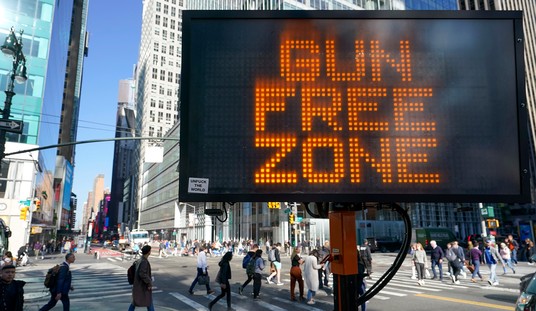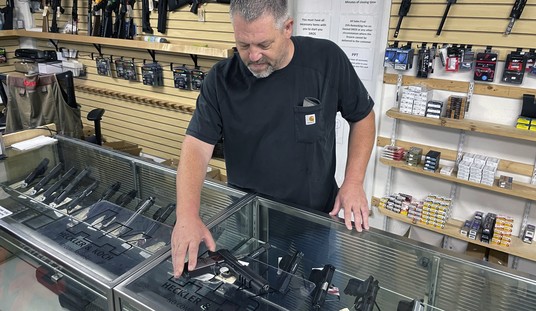Virginia state Senator George Barker, a Democrat who represents portions of Fairfax and Prince William counties in the D.C. suburbs, has introduced SB 240, a “red flag” firearms seizure bill that’s one of the key items on Governor Ralph Northam’s anti-gun agenda.
As with every other “red flag” or Extreme Risk Protection Order law, the bill introduced by Barker has several issues that pose risks to the due process rights of Virginians, as well as a myopic focus on guns instead of the individual who has been deemed a danger to themselves or others.
Let’s take a look at the language of the bill (keep in mind if you read the entire bill that only the proposed addition to state law is italicized):
Upon the petition of an attorney for the Commonwealth or a law-enforcement officer, a judge of a circuit court, general district court, or juvenile and domestic relations district court or a magistrate, upon a finding that there is probable cause to believe that a person poses a substantial risk of personal injury to himself or others in the near future by such person’s possession or acquisition of a firearm, shall issue an ex parte emergency substantial risk order. Such order shall prohibit the person who is subject to the order from purchasing, possessing, or transporting a firearm for the duration of the order. In determining whether probable cause for the issuance of an order exists, the judge or magistrate shall consider any relevant evidence, including any recent act of violence, force, or threat as defined in § 19.2-152.7:1 by such person directed toward another person or toward himself. No petition shall be filed unless an independent investigation has been conducted by law enforcement that determines that grounds for the petition exist. The order shall contain a statement (i) informing the person who is subject to the order of the requirements and penalties under § 18.2-308.1:6, including that it is unlawful for such person to purchase, possess, or transport a firearm for the duration of the order and that such person is required to surrender his concealed handgun permit if he possesses such permit, and (ii) advising such person to surrender any firearm that has not been taken into custody pursuant to a search warrant issued pursuant to this section to the law-enforcement agency that served the order.
So, under this red flag proposal, only law enforcement could go to a judge to request such an order. That should cut down on false reports. Unfortunately, the bill only requires that a judge determine there is “probable cause” that someone poses a “substantial risk” to themselves or others, which is a very low legal bar.
The bill also strips individuals of their legally owned firearms before they’ve ever had their day in court. Barker’s bill requires a judge to “consider any relevant evidence,” but the actual subject of the red flag request won’t even speak to the judge until after the order has been granted.
If a judge issues an ERPO, they will also issue a search warrant that allows officers to enter the subject’s home to look for any legally owned firearms. This will be the first moment that the subject of the order will be aware of what’s happening to them.
There’s one twist in the proposed law that is good for gun owners, but it speaks to what a bad idea the bill is to begin with. See if you can spot it in the paragraphs below.
F. During the execution of a search warrant issued pursuant to this section, the person who is subject to the order shall be informed of the items sought and given the opportunity to voluntarily relinquish any firearm, though voluntary relinquishment shall not preclude the law-enforcement officer from conducting a search if he has reason to believe the person who is subject to the order has not relinquished all firearms in his possession. The law-enforcement officer executing the search warrant shall take custody of any firearm that is in the person’s possession or that is owned by the person. The law-enforcement agency that takes into custody a firearm pursuant to a search warrant shall prepare a written receipt containing the name of the person who is subject to the order and the manufacturer, model, and serial number of the firearm and provide a copy to such person.
G. If the location to be searched during the execution of the search warrant is jointly occupied by the person who is subject to the order and other persons, and the law-enforcement officer executing the search warrant finds a firearm that is not owned by the person who is subject to the order, the firearm shall not be taken if there is no independent evidence of unlawful possession of the firearm by the owner of the firearm. The owner of the firearm shall be given written notice by the law-enforcement officer executing the search warrant of the requirements and penalties under § 18.2-308.2:1.
So, someone is deemed to pose a substantial risk to themselves or others by a judge. Police use a search warrant to enter the home and confiscate the subject’s legally owned gun so they can’t hurt themselves or others with it. The subject’s spouse also owns a gun, but hers isn’t taken, even though its stored in the couple’s bedroom right alongside his pistol.
Does this really make anybody any safer? Again, I’m not saying that the solution is to remove all firearms from the home, including those not owned by the subject of the red flag order. I’m saying this bill is ridiculous from the get-go, because it ignores the individual who’s supposedly a substantial risk to themselves and others and focuses exclusively on the guns they might own.
14-days after the ex parte order is issued, the subject of the red flag order finally gets their day in court. Now the State has to prove with “clear and convincing evidence”, not just probable cause, that the subject of the order poses a substantial risk to themselves and/or others. If a judge finds in favor of the state, the individual’s Second Amendment rights are suspended for 180 days, with the state having the option of renewing their order every 180 days thereafter. On paper, this appears to be an attempt at looking reasonable by only allowing a six-month suspension of the right to keep and bear arms, but in practice someone’s rights could be denied for the rest of their life, one six-month extension at a time.
As for the subject of the red flag order, once their firearms are taken from them they’re left to themselves, along with their sharp knives, pills, rope, gasoline, matches, and other everyday objects they could use to hurt themselves or others. There is no mental health treatment offered or ordered in Barker’s proposed legislation. In fact, the words “mental health” do not appear anywhere in Barker’s language about Extreme Risk Protection Orders.
In Virginia, gun-related suicides account for about 2/3rds of all deaths involving firearms, and about half of all suicides. While the numbers of gun-related suicides have been trending upward over the past two decades, so has the rate of non-gun related suicides. This isn’t just a “gun problem.”
In 2017, Virginia had 1,241 opioid overdose deaths, almost twice the number of gun-related suicides and more than gun-related suicides and homicides combined. In small towns like Farmville and big cities like Richmond, heroin and fentanyl are clearly available. Journalist Beth Macy recently published an entire book on the devastating effects of the opioid trade in the Shenandoah Valley, from the pill mill doctors to the drug pipelines stretching from nearby cities like Baltimore to far-flung locales south of the border in Mexico.
People are killing themselves in Virginia, but Senator Barker just wants to take their guns away. It’s an obscene response to a genuine mental health crisis in the state and around the nation. Simply put, SB 240 isn’t a bill about saving people’s lives or improving their mental health, but about taking away their guns. Beyond the clear constitutional concerns, the deep indifference to the very real suffering from Virginians who need help is a needless cruelty that will only harm those who truly pose a risk to themselves or others.









Join the conversation as a VIP Member